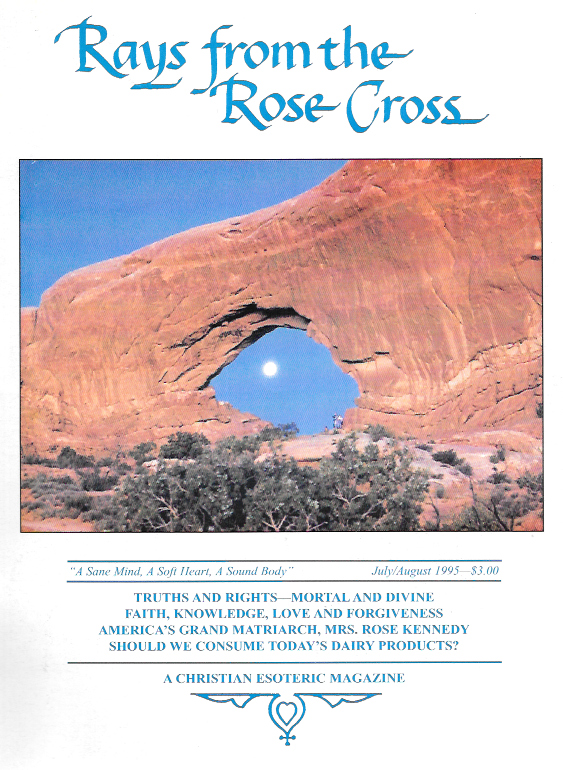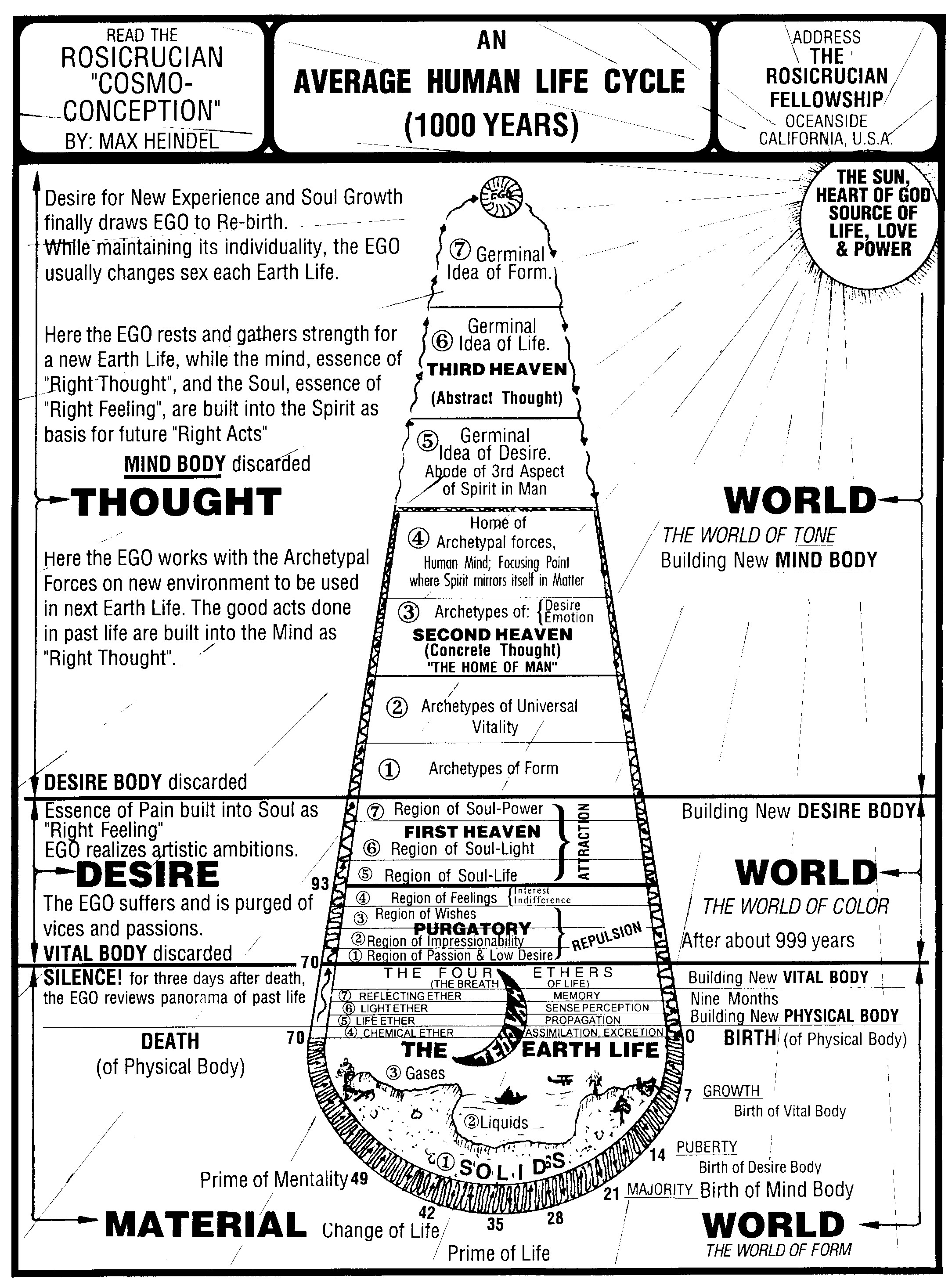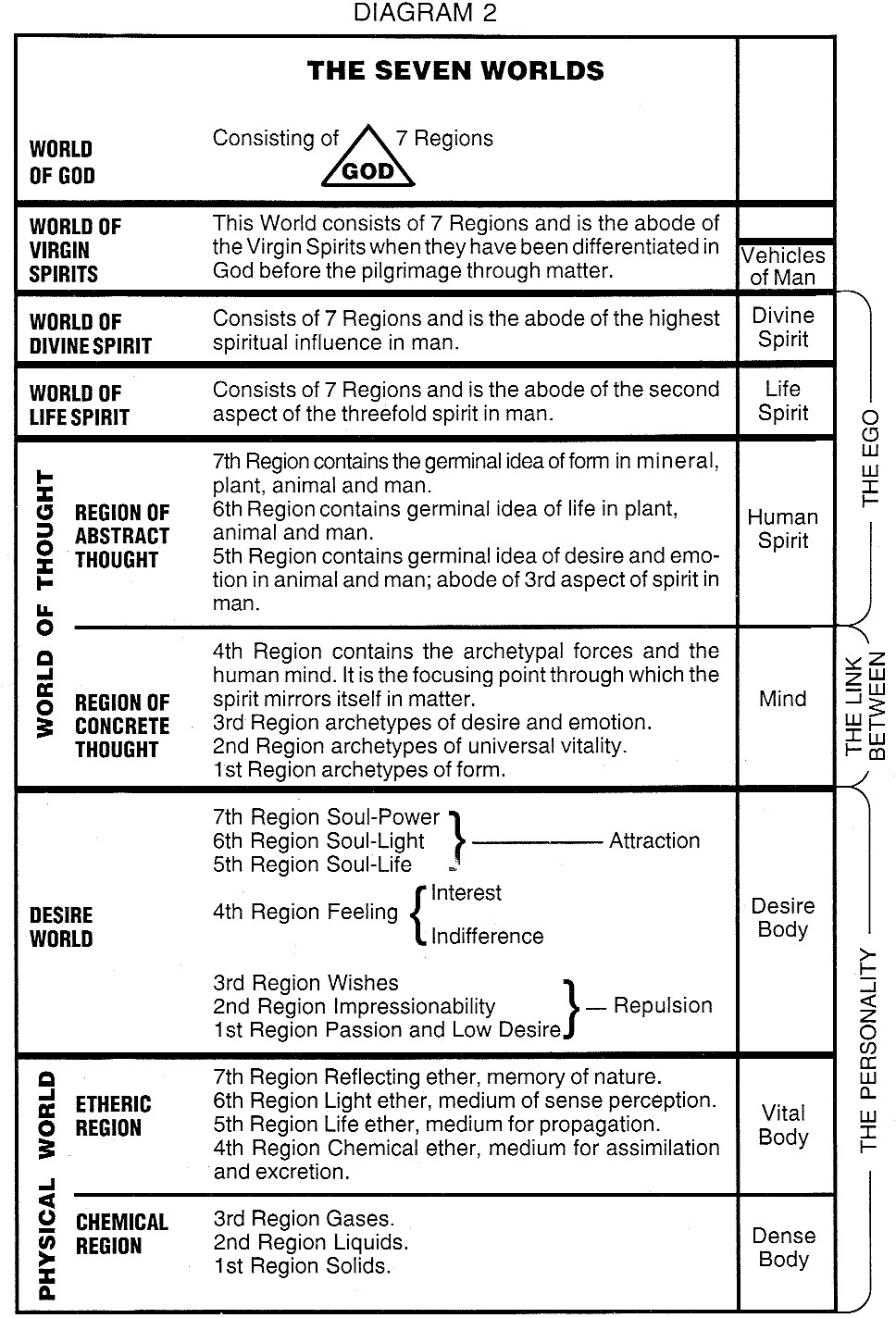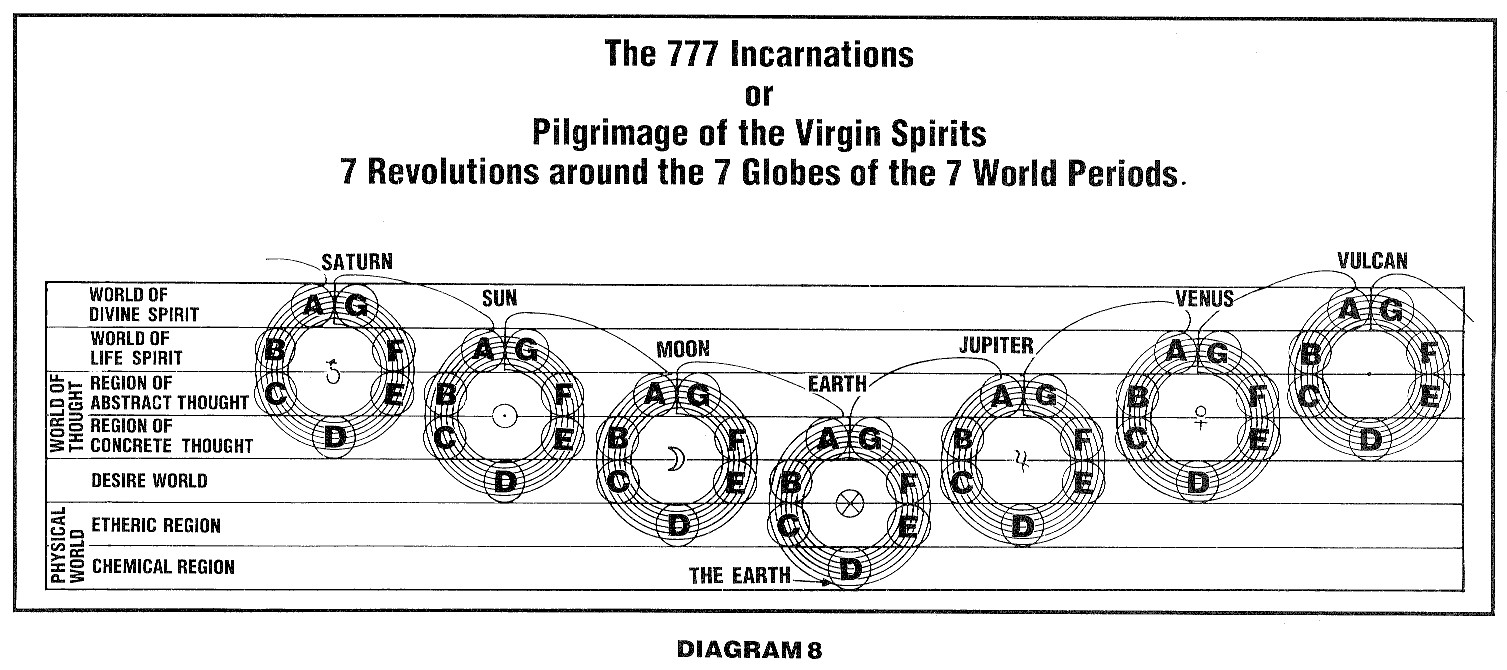
| rosicrucianU.com | ||
| Simplified Scientific Christianity |

Is Rosicrucianism a religion? Not in any traditional sense of the word. But it is religious. It espouses Christianity, but a Christianity not yet conspicuously in evidence. What is religion? Etymologically the word means to bind back, which suggests religion's function: to return man or turn man (convert) to God, to redirect and raise his mundane consciousness to the object of its rightful contemplation. Generally, religion means theism or belief in God. Rosicrucianism thus serves a complementary role to religion. It aims to facilitate and strengthen human Godwardness, to remove barriers that may exist between the believer and God. For Rosicrucianism, the main barrier is ignorance. And for modern man, that ignorance is born of pride and materialistic thinking.
Rosicrucianism was given to humanity in anticipation of the inadequacies of traditional religion to contend with evolving humanity's increasingly demanding and logic-driven intellect. The overriding concern of the Brothers of the Rosicrucian Order was to "make no statements that are not supported by reason and logic." Modern man wants to know why he should believe before he will consent to try to believe. Max Heindel was chosen by the Elder Brothers to meet that need. The Rosicrucian Cosmo-Conception (hereafter RCC) is the result. It is not dogmatic and appeals to no no other authority than the reason of the reader. Traditional religion does not appeal to reason. It simply demands acceptance of and implicit faith in its pronouncements. But in the Cosmo and the Rosicrucian Christianity Lectures (hereafter RCL) "advanced Science has again become the co-worker of In the Cosmo an effort has been made to "spiritualize Science and make Religion scientific," a practice first begun by Christian Rosenkreuz, whose object was to throw "occult light upon the misunderstood Christian Religion and to explain the mystery of Life and Being from the scientific standpoint in harmony with Religion" (RCC, p. 518). How does Max Heindel view traditional religion? Not with great favor. "The religion miscalled Christianity has...been the bloodiest religion known" (RCC, p. 392). In present day churches "Reason is drowned in dictums and dogma" (Freemasonry and Catholicism, p. 32, hereafter F&C). "Religion has been terribly tarnished in the course of time, its purity has long since vanished under the regime of creed, and it is no longer Catholic, that is to say, Universal" (F&C, p. 97).
Truth is what religion is about, ultimate truth. But church theologies can only propose truth, as it were, by fiat, to be accepted on faith, a condition the imperious intellect finds inadmissable. The Rosicrucian student, on the other hand, "is taught to be always ready to give a reason for his faith" (F&C, p. 33). Orthodox religions teach salvation through the Atonement, the shed blood of Jesus. Rosicrucianism teaches that perfection is attained through the right use of the twin Laws of Rebirth and Consequence. While the subtitle of the Cosmo is Mystic Christianity, Heindel was, by leaning and demonstration, an occultist: he had an urgent need to know. "A Mason at heart," he was "frankly opposed to Catholicism" with what he called a "spiritual opposition" (F&C, p. 6).
The motto of occultism is "There is but one Sin-Ignorance; and but one Salvation-Applied Knowledge" (Rosicrucian Christianity Lectures, p. 20). Where is spiritual knowledge obtained? From "the Great Western Mystery School of the Rosicrucian Order" (Rosicrucian Mysteries, p. 19, hereafter RM), which has been entrusted with "molding the thought of Western Europe" (ibid, p. 9). Its teachers are Elder Brothers, its curriculum includes the science of the soul and the science of the spirit, and its pupils and students are those bold souls who desire to take their salvation (read initiation) into their own hands and storm heaven. They are the "undaunted spirits who refuse to be fettered by either orthodox science or orthodox religion" (Rosicrucian Cosmo-Conception, p. 519).
A student of the Rosicrucian Teachings may cherish its tenets with religious zeal, but he knows that they do not pretend to dictate how one worships God, for worship is the province and at the heart of religion; or, more correctly, worship is the heart of religion, its motive power and its life's blood. The Teachings subserve and enhance worship. In turn, worship is inspired, sustained, and organized by liturgy, which is loosely synonymous with it, but may more precisely be taken to identify all church-related activities that focus consciousness toward and on God, including scripture readings, hymns, psalms, chanting, prayer, sermons, offertory, Holy Communion, and other sacramental and ritual or ceremonial movements and gestures. While worship may be individual and solitary, liturgy (literally, work of the public, public service) is always communal. Herein we encounter a critical distinction between religion and the Teachings. The Teachings emphasize individual responsibility for one's spiritual growth. Religion is eminently a community enterprise. While Fellowship is a precursor of universal Brotherhood, it is primarily spiritual Fellowship that is meant, not the social, fraternal and congregational association of believers in a church.
"Freemasonry [and Rosicrucianism] teaches the candidate to work out his own salvation; Catholicism leaves him dependent on the blood of Jesus. Those who use the positive method naturally become the strongest souls; therefore Freemasonry [and Rosicrucianism] should be fostered rather than Catholicism" (Letters To Students, #29, hereafter LS). Here Heindel is sounding what some might regard as a brash clarion call to spiritual self-reliance, bordering on spiritual arrogance. "The dominant church does not view with complacence the secession of its children. It would even prostitute the Spirit of Truth to do its bidding" (LS, #27) .
As a Wisdom Teaching, Rosicrucianism is a cosmology, in that it traces the origin of our cosmos from chaos to its projected completion in the Vulcan Period where Creation shall have achieved what our present minds can only conceive as an incomprehensible state of perfection. Rosicrucianism is a theosophy, in that it identifies all that is as a differentiation in and an extension of God. It is frequently called a philosophy, being a "definite, logical, and sequential" formulation of ideas, clearly articulated and rationally founded. Heindel describes Rosicrucian aspirants as "students of transcendental philosophy" (LS, #14), and, in the Cosmo's introductory "Word to the Wise," the author calls his exposition a "new philosophical effort" in the search for universal truth. It is an anthroposophy, in that it details man's origin and evolution from a nascient spark of divinity to a superconscious, plenipotent spirit participating in the totality of universal Being.
While religions are rife with mysteries, Rosicrucianism seeks to uncover and explain mysteries. The "Fellowship does not believe in secrecy or mystery" (LS, #39). "The Rosicrucian Order was started particularly for those whose high degree of intellectual development caused them to repudiate the heart" (RCC, p. 439), and thus was apt to tempt them into agnosticism or even atheism. As Heindel says, "Many among us have been impelled by Reason to withdraw from the Church," only to form, ironically, a new ecclesia of believers liberated from the strictures of orthodox dogma.
The Teachings are actually designed to overcome the limitations of the Race religions, which, being based on law, make for sin and bring pain, sorrow and death. "Only from within is it possible to conquer the Race religions,which influence man from without"(Rosicrucian Cosmo-Conception, p. 380). While "the law of the Race religions was given to emancipate intellect from desire" (RCC, p. 395), the Rosicrucian Teachings are designed to liberate the heart from the scepticism of the intellect so the true Christian religion may be wholeheartedly embraced.
The Teachings are designed to accelerate the inception of the religion of the Son, Christ, through purification and control of the vital body, as they enable humanity better to subdue the desire body and join with the Holy Spirit, and, in the future, promote the religion of the Father by spirtualizing the dense body and bringing about a true cosmic unity (RCC, pp. 433-35). The teachings, then, are a priceless gift to humanity enabling it to more fully and effectively participate in God's plan for its divinization.
"Christian Rosenkreuz was given charge of the Sons of Cain who seek the light of knowledge at the sacred fires of the Mystic Shrine [inner temple]...to work out their own salvation" by fashioning the Golden Wedding Garment, the Philosopher's, or Living, Stone, Christ (F&C, pp. 97-98), for they believe more in works than in faith (F&C, p. 56). "Jesus, the Son of Man, stands as the genius and protector of all churchcraft, whereby religion is fostered and man is brought back to God along the heart path of devotion."
Each of today's religions "has its mission to perform for the people among whom it is found (LS, #91), but "none have more than a ray of the whole truth at present"(LS, #37). Therefore, "It behooves us to rise above the barriers of nationality [and race religion] and learn to say as did that much maligned man, Thomas Paine, 'The world is my country and to do good is my religion"' (LS, #48).
Heindel urges the Rosicrucian student not to "imitate the militant missionary spirit of the churches, but, as the Bible says, give our pearls of knowledge only to those who are tired of feeding on the husks and long for the true bread of life" (LS, #37). "Neither let us obtrude our views on them nor seek to make converts to our mode of living among those who are not yet ready. The change ought to come from within" (LS, #10). Here is identified a signal difference between the Rosicrucian Teachings and orthodox religions. The latter are to be received and believed on the basis of external authority, including Scripture, ecclesiastical hierarchy, writings of the Church fathers, threats of excommunication and eternal damnation. A canon of belief is defined, outside which one treads as possible apostate or heretic. How many have left their churches, Heindel rhetorically asks, because of cramping creed? His poem "Creed or Christ?" (see page 24) contrasts the one Truth represented by Christ, the Lord of Love, with the various religious "takes" on truth that necessarily become divisive, exclusive and punitive.
The Rosicrucian Teachings do not propose to be the final word on truth, recognizing that religions evolve as mankind evolves. Precisely for this reason do the Teachings not constitute categorical religion but provisional truths and mediating ideas. "What, then, is the way to the heights of religious realization, and where may one find it?...It is not found in books...The Within then is the only worthy tribunal of truth. If we consistently and persistently take our problems before that tribunal, we shall in the course of time evolve such a superior sense of truth that, instinctively, whenever we hear an idea advanced, we shall know whether it is sound and true or not" (LS, #83).
"Truth cannot be found in creed-bound religion; who seeks it must be untrammeled by allegiance to anyone" (LS, #27). These are strong, even frightening words, intended only for those who feel addressed by them. "Rosicrucians insist that all who come to them for deeper teaching must be free from allegiance to any school, and the candidate is not bound by oaths at any stage. Whatever promises he makes are made to himself, for liberty is the most precious possession of the soul, and there is no greater crime than to fetter a fellow being in any manner" (ibid).
Christ said "I am the Truth." He also said that He was sending the Spirit of Truth, the Holy Spirit, to dwell within each of us to teach us all things. Here, then, is the radiant kernal of religion. In the Holy of Holies, in the soul's temple, from out of the depths of purified quiet, in the sanctuary of the regenerate heart and the transformed mind, the voice for Christ speaks. Here we ever turn for answers to our questions, for consolation for our temporal distress, for illumination of our besetting darkness, for the truth that will set us free. Nor did Heindel cease from an "emphatic insistence on absolute personal freedom in the Rosicrucian Fellowship" (LS, #20). "Among the older souls of the West who aspire to spiritual growth, there can be no Master or Guide. We are to learn to stand alone. We may not like it; we may be afraid, and want a Master or Guide to free ourselves from responsibility." Where is the religion here? We are told, in fact, that we have had our religion, our milk, as Paul would say. Now we have our meat. The time of outward dependency has concluded. The Western Teacher makes himself known by not answering but responding "more like the parent bird which pushes the young off the nest if they do not go themselves. We may hurt ourselves, but we do learn to fly" (ibid).
While Rosicrucian Teachings are not religious in the usual sense, they are essentially Christocentric; that is, they point to Christ as the Wayshower and the Light upon the path of spiritual unfoldment. The Teachings make clear that the life of Christ Jesus patterns the life of the spiritual aspirant; that the exoteric, historical Christ is to become the esoteric, personal, interior Christ. Here is meat indeed! And "'If thou art Christ, help thyself.' No one who is a 'leaner' can at the same time be a helper; each must learn to stand alone" (LS, #24). For these there is no religion. But there is Christ. And if Christ is with one, and within one, who can be against one? For He has overcome the world. And for the Rosicrucian aspirant, the Annunciation is taken to heart as the wondrous words spoken to his own soul: "Hail, Mary, Mother of God, blessed art thou." And now, in travail, we carry the incipient Christ, the hope of Glory, gestating within us, to be mystically born when our preparatory term is fulfilled.
The cosmic sacrifice of the Christ made possible the lifting (rending) of the veil to the human spirit's temple, so that whosoever will may enter. "Since then no secrecy has prevailed in initiation" (LS, #42). The Rosicrucian wisdom gives the incentive and reason for entering that temple. Indeed, it reminds us that the outer is a sign and symbol of the hidden inner truth. As best intended, Rosicrucian Teachings awaken our sense of wonder and gratitude, and sufficiently satisfy our intellectual hunger that we may then, as it were, capitulate and become meek in heart and justly chastened before our Creator Father and reverent in the immanent company of His Son, Christ, our Elder Brother and spiritual Prototype. Then we may, with renewed ardor and firm resolve, commit our persons and lives to attaining our spiritual birthright and embark on that designated shortest, safest, most joyful road to God.
True religion is both what I believe and what I do. What I believe alone is insufficient for emigration to the Kingdom of Heaven. Belief tells me that it exists and that I am summoned to live there. It does not, of itself, provide me with some magical transportation. Mere faith in the Rosicrucian Teachings will result in my hopes for translation being stillborn. However, sufficiently strong faith overflows into and initiates action, works works, fires the imagination to see and go beyond daily obstructions and away from the false claims and allures of secular pleasures.
We arrive, finally, at the crux of the Teachings. The road to God is through, in, and by Christ-and Christ came to serve. Traditional religions hold services in their churches. The Rosicrucian aspirant seeks to perform service everywhere, making of the world his church. The keynote of Christian service is good will, willing good, caritas. Good will is God's will and charity is the spiritual substance of God because God is Love. Love is God's law. The Teachings, then, are not an end in themselves but a means to an end.
While the Cosmo was written to satisfy the inquiring intellect so that the devotional side of the aspirant's nature might be allowed to develop, the author expressed his growing fears that this knowledge might but be whetting intellectual appetites without achieving the intended conversion, and "unless the book gives the student an earnest desire to transcend the path of knowledge and pursue the path of devotion, it is a failure, in my estimation" (LS, #16); "for though we have all knowledge and can solve all mysteries, we are but as tinkling cymbals unless we have love and use it to help our fellow creatures" (ibid). So we explore the cosmos, intellectually plumb the depths of creation, unearth the mysteries of being only as a means to an end: that we may more charitably live in the here and now; that we may more effectively serve here, now; that we may put on as our permanent being the Being of Christ, Who is here, now.
The Rosicrucian Fellowship is not constituted by its Teachings, which are open to the whole world and assented to by many non-students. "Rather, it is the service we perform and the earnestness with which we practice the Teachings and become living examples to the world of brotherly love" (LS, #3). We are reminded that know-ledge, however sublime, may puff up, while charity edifies. We are correctly oriented when we remember that "service is the standard of true greatness" (LS #40). We are informed that "the union of the temporal and spiritual power, the head and the heart, [knowledge and faith]...must take place before Christ, the Son of God, can come again" (Q&AII, 300). We understand that Christian Rosenkreuz is a co-worker with Jesus in uniting humanity and bringing them to the Kingdom of Christ.
Religion denotes a gathering of the faithful, for whenever two or three are gathered together in my Name, there am I. The Name is both the theology and the liturgy. The Name is Truth, the Name is Power. The Name signifies real and present Love. The gathering itself is the liturgy; the saying of the Name outwardly is litany, inwardly it is prayer or meditation. Ideally, all religious teaching, be it Rosicrucian, Catholic, Theosophical, or Orthodox, leads to this focus on and experience of the Presence of the Light of the world, the Prince of Peace. In spiritual fellowship is invocative power. But we are also told by John that any one who believes on Christ, the Logos, is given power to become the Son of God. Here is power indeed. What is in a name? In this name, everything.
The true Christian religion, embodying the one Truth, the only universal religion, reminds us of our unity in God through Christ, a unity from which none is exempted. May this understanding work into our hearts and actions, and restore us to our right minds so that we may glorify God and be lifted up in this very exaltation. Teachings from any quarter, from without or from within, liturgies as somber as Calvinism, as quiet and contemplative as Quakerism, as resplendent as Catholic High Mass-all at their intended best, when one is in the throes of fervid worship, are conceived for one purpose: to direct us to and to hallow us in the one Being in and by Whom we were created and in Whom we ever abide. So may we ever better know and love this Being, the Home and Source of our own true Self.
— C.W.
— Rays from the Rose Cross Magazine, November/December, 1995

|

|

|
|
|
Contemporary Mystic Christianity |
|
|
This web page has been edited and/or excerpted from reference material, has been modified from its original version, and is in conformance with the web host's Members Terms & Conditions. This website is offered to the public by students of The Rosicrucian Teachings, and has no official affiliation with any organization. | Mobile Version | |
|